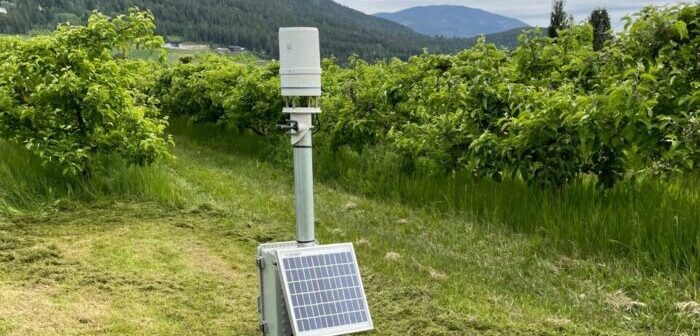Canadian food and agriculture initiative the Fields Forward Society is launching a climate change decision management tool for farmers in the Creston Valley, British Columbia, which will work in tandem with a new weather station network.
Funded by the Province of British Columbia, it will give farmers and local governments in the Creston Valley a critical tool in adapting to the changes in climate the region is already undergoing.
The program, initially started by Fields Forward as a ‘scientific climate modeling for agriculture’ project, has now developed into two programs. One involves weather stations and software for tree fruit growers funded by the British Columbia Ministry of Agriculture and Food.
The other is Fields Forward-led support for all farmers, funded by the Columbia Basin Trust and enhanced with support from the Regional District of Central Kootenay (RDCK)-Area B. Fields Forward is receiving C$103,900 (US$80,000) from the Columbia Basin Trust and C$50,000 (US$38,500) from the RDCK for its climate adaptation programs and services.
Overall, the provincial and Fields Forward/CBT/RDCK programs will see up to 10 weather stations built in the Creston Valley. Five of those are being funded with the RDCK grant for beef, forage and grain producers and local governments.
The weather station project will support the agriculture sector and inform response efforts to natural disaster events related to climate change. The stations will be placed strategically on private properties. Real-time data collected will be readily available to and utilized by local government agencies, farmers, the BC Wildfire Service and other public agencies engaged in natural disaster response and mitigation efforts. The new wireless weather stations will measure and record air temperature, relative humidity, vapor pressure, barometric pressure, rainfall, wind speed and gust, wind direction, solar radiation, leaf wetness and nearby lightning strikes (count and distance). Each station’s data will be transmitted over a wireless low-power wide-area network (LPWAN).
In 2021, Fields Forward looked at providing Creston Valley farmers with weather station software. That advocacy work, supported by the Columbia Basin Trust, led to the BC Ministry of Agriculture’s decision to fund the system for the valley’s tree fruit industry.
Cathy Finley, Fields Forward Society co-chair and co-owner of Little Dog Farm in Lister, said, “This is a big win for the tree fruit growers and all farmers in the Creston Valley. Because the Trust recognized the importance of providing farmers with tools and technology to adapt to climate change, the BC Ministry of Agriculture and Food is building on this momentum and expanding the service.”
The RDCK portion will also give local government access to weather data using a specialized dashboard for disaster mitigation and climate adaptation. The climate adaptation tool and disaster mitigation infrastructure project will significantly enhance real-time weather data collection in the Creston Valley to support agricultural producers and public agencies in their efforts to adapt to a changing climate and respond to natural disaster events.
Katie Kendall, senior manager of special initiatives at the Columbia Basin Trust, said, “This project will enable farmers in Creston to access weather data that is essential to adapting to short- and long-term climate change impacts, making informed business decisions and ensuring that healthy food is produced locally in the Basin, all of which are important to people in the region. We thank Fields Forward for its efforts, plus the project’s supporters.”
Freddy von Harling, the manager of Piper Farms, added, “Since Creston has so many microclimates, it will be helpful to predict what the weather will do in this valley; it will make it easier for us to make a harvest decision for hay or grain. It also will help with application of herbicides – we will not have to guess anymore what the wind and humidity will do throughout the day.”
In recent years, the Creston Valley has been hit by extreme weather events, including but not limited to extreme drought, which caused irrigation water restrictions and led to dry wells; extreme heat events (heat domes) that severely damaged or destroyed crops, including cherry orchards, the valley’s major fruit industry; extreme rainfall events that caused overland flooding and destroyed crops; mild winters that led to increased pest growth patterns and distribution.



